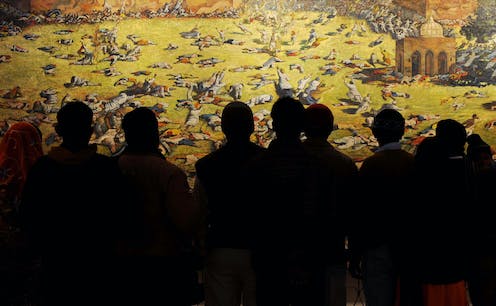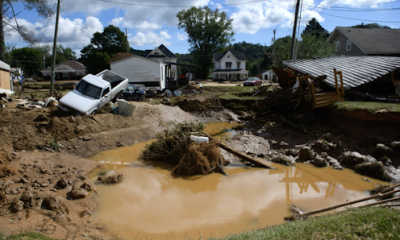
Indian visitors look at a painting depicting the Amritsar Massacre at Jallianwala Bagh. Narinder Nanu/AFP via Getty Images)
The king of the Netherlands, Willem-Alexander, apologized in July 2023 for his ancestors’ role in the colonial slave trade.
He is not alone in expressing remorse for past wrongs. In 2021, France returned 26 works of art seized by French colonial soldiers in Africa – the largest restitution France has ever made to a former colony. In the same year, Germany officially apologized for its 1904-08 genocide of the Herero and Nama people of Namibia and paid reparations.
This is, some political scientists have observed, the “age of apology” for past wrongs. Reams of articles, particularly in Western media, are devoted to former colonizer countries and whether they have enacted redress – returned museum artifacts, paid reparations or apologized for past wrongs.
Yet this is rarely the result of official requests. In fact, very few former colonies have officially – that is, government to government – pressed perpetrators to redress past injustices.
My analysis found that governments in 78% of such cases have not asked to be compensated for historical acts of injustice against them. As a scholar of international relations who has studied the effect of colonialism on the present-day foreign policy of countries affected, I found this puzzling. Why don’t more victim states press for intercountry redress?
The answer lies in the fact that colonial pasts and atoning for injustices are controversial – not just in what were perpetrator countries, but also in their victims. What to ask redress for, from whom and for whom are complicated questions with no easy answers. And there are often divergent narratives within victim countries about how to view past colonial history, further hampering redress.
Focus on perpetrator country
There is a disproportionate amount of attention paid to whether perpetrator countries – that is, former colonizers who established extractive and exploitative governments in colony states – offer redress. They are lauded when they enact redress and shamed when they do not.
The processes pertaining to redress within victim countries – the former colonies – gets less attention. This, I believe, has the effect of making these countries peripheral to a conversation in which they should be central.
This matters – success or failure of redress can depend on whether victim countries officially push for it.
Take the experiences of two formerly colonized countries that I studied in depth in relation to the question of redress: India and Namibia.
The Indian experience: Different narratives
It’s difficult for a country, particularly a poor developing nation, to take a former colonizer, usually a much richer country, to the International Court of Justice to ask for redress for the entire experience of colonialism.
But most former colonies have never officially asked for some form of redress – be it apology, reparations or restitution, even for specific acts of injustice.
India is an example of the difficulty in building consensus for official redress. Take the Jallianwala Bagh massacre of 1919, in which British troops killed hundreds of peaceful protesters, including women and children.
The Indian government has never officially asked for an apology from the United Kingdom over the incident.
Part of the problem is different groups within India have different narratives about the 200 years of British colonial rule. No one disputes that the Raj was exploitative and violent. But which acts of violence to emphasize? How much responsibility should be assigned to the British? And should any positive attributes of the Raj be highlighted? These are all debated.
Such points of divergence are reflected in India’s federal and state-issued history textbooks, according to my analysis.
The bloody Partition of India in 1947 and the subsequent creation of Pakistan, for example, are blamed on the British in federal and many state textbooks. But it merits just a small paragraph in Gujarati textbooks, where it is blamed entirely on the Muslim League, the founding party of Pakistan. In the state of Tamil Nadu, Partition is mentioned without any description of either the horrors that followed or where responsibility lay.
Different narratives also appear in the Indian Parliament. When the issue of redress came up in 1997 – the 50th year of Indian independence and just before Queen Elizabeth II visited India – politicians agreed that India’s emergence from what politician Somnath Chatterjee described as “a strangulating and dehumanizing slavery under a colonial imperialist power” was worth celebrating. But on the issue of whether Elizabeth should apologize for the Jallianwala Bagh massacre, there was little agreement. Calls from some politicians for an apology were drowned out by others who jabbed at the ruling Bharatiya Janata Party, pointing out its allies had never apologized for assassinating Mahatma Gandhi.
As of this writing, the U.K. has expressed regret for the massacre but never apologized, infuriating many Indians.
The long journey for Namibian redress
Namibia is an uncommon case of redress where the government has officially pushed for an apology and reparations from its former colonizer, Germany. But even then it was a painful, complex and time-consuming process dogged by many of the themes that have prevented India and others from seeking formal redress.
Between 1884 and 1919, Namibia was a German colony, with some communities systematically dispossessed of their traditional lands. In 1904, one of these communities, the Herero, rebelled, followed in 1905 by the Nama. In response, German troops slaughtered thousands in a bloodbath that is today widely acknowledged to be a genocide. Survivors, including women and children, were herded into horrific concentration camps and subjected to forced labor and medical experiments.
Captured Herero fighters in 1904.
Ullstein Bild via Getty Images
The struggle to hold Germany accountable began decades ago, with individuals from the Herero and Nama communities calling for accountability and reparations. Germany rebuffed them repeatedly, precisely because the Namibian government did not take up their call. Only in 2015, after the Namibian government officially requested redress, did Germany acquiesce.
In May 2021, Germany finally agreed to recognize the genocide, apologize and establish a fund of US$1.35 billion toward reconstruction and development projects in Herero- and Nama-dominated areas.
Why did it take so long? For the Herero and Nama, the genocide and loss of traditional lands were always forefront. But for others in Namibia – notably, the dominant political party, the South West Africa People’s Organization, or SWAPO, which consists largely of members of the Ovambo ethnic community – uniting Namibians to come together in a national, anti-colonial struggle for independence was deemed more important than focusing on the wrongs suffered by any one community.
After independence, the ruling SWAPO prioritized nation-building and unity and cultivated ties with the German government, hoping for foreign aid and economic development. Complicating matters, the Ovambo had not lost their own traditional lands to colonialism in the same way as the Herero and Nama.
For years, government-approved school history textbooks used in Namibian schools reflected the SWAPO narrative. One Ovambo former school history teacher told me that Namibian children learned about the “war of national resistance” and how exploitative colonialism had necessitated that war. But the word “genocide” was never used, and there were no mentions of the suffering of affected communities.
Around 2010, Namibian activists, NGO workers and government officials from all communities began to search for common ground to reconcile the different narratives. Some attempts failed. A 2014 museum exhibition on the genocide collapsed after its financier, the Finnish embassy, withdrew funding – allegedly under pressure, one Namibian expert told me, from the German government. But others succeeded. The National Archives of Namibia launched a project to collect academic papers on divergent narratives of the liberation struggle and colonial history.
As reconciling narratives progressed, history textbooks were revised to honor not just SWAPO’s version of history, but also highlight the brutalities suffered by the Herero and Nama. They included frank discussions of genocide and colonial atrocities. Against this backdrop, the Namibian government officially initiated a request for redress from Germany. Both governments appointed teams to find a resolution, resulting in the 2021 reparation fund.
Redress between countries is rare. Successful redress even more so. But the example of Namibia shows that it can be done when the governments of victim countries initiate redress. By focusing only on perpetrator states, we miss an opportunity to examine their victims as agents of change, and thereby perpetuate redress as an unusual phenomenon.
Manjari Chatterjee Miller is affiliated with the Council on Foreign Relations.
Advertisement

Advertisement
Contact Us
If you would like to place dofollow backlinks in our website or paid content reach out to info@qhubonews.com











